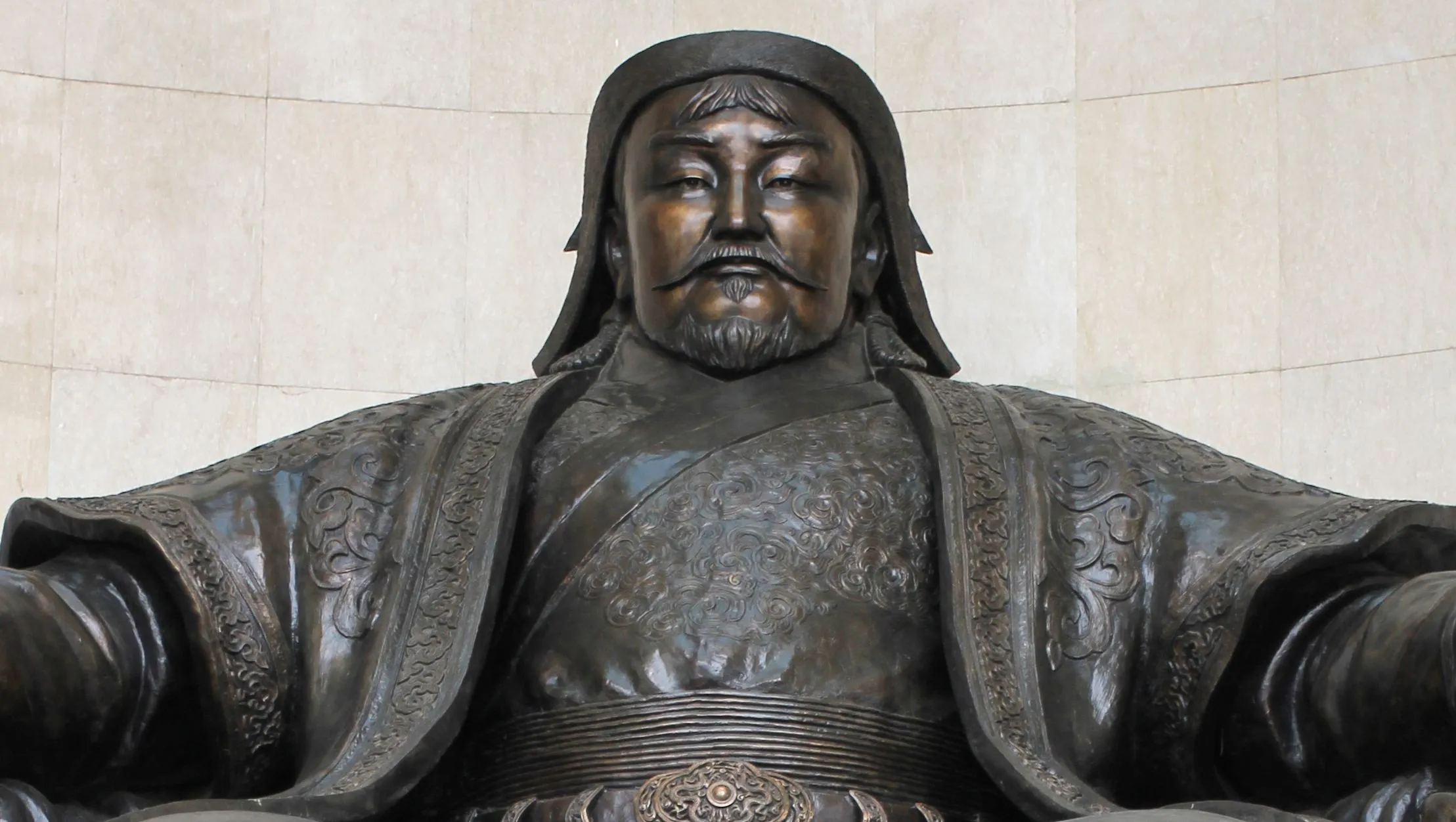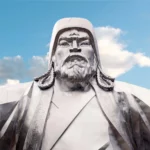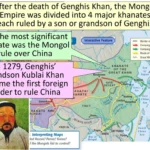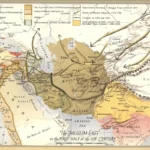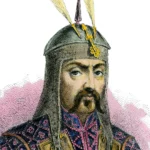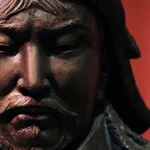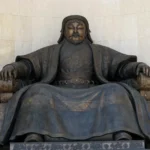Let’s travel back in time and meet Genghis Khan, a military genius who led the Mongols to conquer vast territories. His strategies were like a well-oiled machine, blending brilliant planning with ruthless efficiency. Get ready to dive into the mind of this legendary warrior and uncover the secrets of his military prowess.
Genghis Khan: A Mastermind of Military Strategies
Genghis Khan, the legendary conqueror, left an enduring mark on warfare. His cunning tactics and innovative strategies made him an unstoppable force. Let’s unravel the secrets behind his military prowess.
Principles of Khan’s Warfare
- Zoom Like a Cheetah: Khan’s army moved lightning-fast on horseback, leaving enemies in the dust.
- Command Like a Boss: He kept his troops in tip-top shape, ensuring they worked together like clockwork.
- Psychological Warfare 101: Khan used tricks like fake retreats and surprise attacks to make his enemies’ minds spin.
Khan’s Secret Weapons
- Lightning Raids: His troops would swoop in out of nowhere, catching enemies napping.
- Archery Circle of Death: Mongol archers surrounded enemies and pelted them with arrows, like a medieval version of a pin cushion.
- Open the Gate and Chase Them: Khan would let enemies escape but then chase them down and crush them.
- Never Give Up the Chase: His relentless army pursued enemies until they begged for mercy.
- Mess with Their Minds: Khan spread rumors and used psychological tactics to make enemies doubt themselves and their leaders.
Uniting Different Clans
Khan’s superpower was his ability to bring together different tribes and cultures under one banner. He gave them the same training, weapons, and discipline, creating an army that was like a well-oiled machine.
Logistics Mastermind
The Mongol army was like a traveling city, complete with food, water, and everything they needed to keep fighting. Khan’s supply lines stretched far and wide, ensuring his troops were always ready for action.
Legacy
Genghis Khan’s military tactics transformed the art of war. His emphasis on speed, deception, and psychological warfare still influence military strategies today. Scholars and generals alike study his brilliance, hoping to harness his power on the battlefield.
Explore the Genghis Khan biography to learn about the legendary conqueror’s life and achievements. Dive into the Genghis Khan history to uncover his path to power and the rise of the Mongol Empire. Discover the vastness of the Genghis Khan empire and its profound impact on world history. Finally, delve into the enduring Genghis Khan legacy to understand his lasting influence and the debates surrounding his reign.
Genghis Khan Tactics and the Rise of the Mongol Empire
Genghis Khan was a master at the art of war. His genius military tactics helped him create one of the largest and most powerful empires in history.
Genghis Khan knew that information was power. He had a vast network of spies who gathered information about his enemies’ strengths, weaknesses, and plans. He also had a fast and efficient communication system that allowed him to coordinate his attacks with precision.
On the battlefield, Genghis Khan used a variety of tactics that were designed to overwhelm and confuse his enemies. One of his favorite tactics was the “ocean wave” cavalry charge. His cavalry would charge the enemy in successive waves, each wave hitting harder than the last. This relentless assault would often break the enemy’s lines and send them fleeing in terror.
Genghis Khan’s cavalry was also highly skilled at archery. They could shoot arrows with deadly accuracy, even while riding at full gallop. This gave them a huge advantage over their enemies, who were often only armed with swords and spears.
In addition to his military prowess, Genghis Khan was also a master of deception. He often used feints and tricks to lure his enemies into traps. He would also spread rumors to demoralize his opponents and make them less likely to fight back.
Genghis Khan’s tactics were so effective that he was able to conquer vast territories in a relatively short amount of time. He created an empire that stretched from the Pacific Ocean to the Caspian Sea. His empire lasted for centuries and had a profound impact on the history of Asia and Europe.
Key Takeaways
Here are some of the key takeaways from Genghis Khan’s military tactics:
- Extensive intelligence gathering is essential for success.
- Rapid communication is essential for coordinating attacks.
- Overwhelming the enemy with successive waves of attacks can break their lines and send them fleeing.
- Highly skilled cavalry and archery can give you a huge advantage over your enemies.
- Confusion and deception can demoralize your enemies and make them less likely to fight back.
- Protracted campaigns can wear down your opponents and gradually weaken their resistance.
- Luring your enemies into specific areas can allow you to execute decisive strikes.
- Combining the effectiveness of swords and arrows can maximize your combat capabilities.
Exploration of Genghis Khan Military Strategies
Step into the war room of Genghis Khan, the undefeated warrior, and uncover the tactics that fueled his extraordinary conquests.
Flexibility: The Mongol Blitzkrieg
The Mongols were like a relentless storm, adapting their tactics to any terrain or enemy. They moved their armies with lightning speed, keeping their opponents off balance and disoriented.
Mind Games: Psychological Warfare at its Finest
Genghis Khan knew the power of fear. He used terror and intimidation to break down enemy morale, demoralizing them even before the battle began. This psychological warfare gave him a significant advantage on the battlefield.
Intelligence: Know Thy Enemy, Inside and Out
Spies and informants whispered secrets into Genghis Khan’s ear. They gathered crucial intelligence about enemy movements and weaknesses, giving him the edge in battle. It was like having a cheat sheet to every battlefield situation.
Unstoppable Warriors: Discipline and Training
Mongol warriors were not just fierce fighters but also disciplined and well-trained. They were skilled in archery, horseback riding, and the art of war. Obedience was their code of conduct, making them a formidable force on the battlefield.
Adapting to the Challenge: No Two Battles Alike
Genghis Khan was a master of adapting his tactics to fit each battle. He had a vast repertoire of weapons and siege engines, ready to outsmart his opponents. No enemy could ever predict his next move.
Conquerors with an Iron Will
The Mongols had an unyielding determination to expand their empire. They faced every battle with an iron will, refusing to be swayed by obstacles or setbacks. It was this relentless drive that made them unstoppable.
Legacy of a Military Genius
Genghis Khan’s strategies have shaped military history forever. His principles continue to be studied and applied by armies worldwide, a testament to the brilliance of this legendary warlord.
Table: Key Strategies of Genghis Khan
| Strategy | Description |
|---|---|
| Flexibility | Adapting tactics to terrain and enemies |
| Psychological Warfare | Using terror and intimidation to demoralize opponents |
| Intelligence Gathering | Collecting information on enemy vulnerabilities |
| Discipline and Training | Enforcing obedience and honing skills |
| Tactical Adaptations | Varying tactics based on specific battles |
| Unwavering Determination | Maintaining an unyielding will to conquer |
Tactics Used by Genghis Khan to Conquer
The cunning and adaptability of Genghis Khan played a pivotal role in his conquests that spanned vast territories. His tactics were not just about brute force; they incorporated a combination of speed, psychological warfare, intelligence gathering, and disciplined command structures.
Genghis Khan believed in the power of flexibility. He tailored his strategies to the strengths and weaknesses of his opponents and the terrain he encountered. From using catapults to breach city walls to exploiting enemy vulnerabilities, his adaptability set him apart from other conquerors.
Psychological warfare was a weapon in Khan’s arsenal. He employed fear and intimidation tactics to weaken enemy resolve. Spreading rumors about the invincibility of his army and using ruthless executions as a demonstration of his power created a psychological advantage that made enemies tremble.
Intelligence was at the heart of Genghis Khan’s military campaigns. He had a network of spies and informants who provided him with invaluable information about his enemies. Captured soldiers were interrogated to extract valuable insights. This intelligence gave him a strategic advantage, allowing him to outmaneuver and outsmart his opponents.
Discipline was ingrained in Khan’s army. Soldiers underwent rigorous training to enhance their agility, endurance, and marksmanship. They were also taught to obey orders without hesitation, ensuring that complex military strategies were executed flawlessly. This discipline kept his army organized and efficient, making it a formidable force on the battlefield.
Genghis Khan’s legacy is not just about the vast territories he conquered; it’s about the tactics he employed to achieve his victories. By combining adaptability, psychological warfare, intelligence gathering, and disciplined forces, he created a military machine that reshaped the world map.
FAQ
Q1: What were the fundamental principles guiding Genghis Khan’s military tactics?
A1: Genghis Khan’s military system emphasized rapid and decisive maneuver, superior operational capabilities, and precise battlefield tactics.
Q2: How did the Mongols’ skilled horsemanship contribute to their military dominance?
A2: The Mongols’ highly skilled and enduring horsemen enabled them to execute lightning-fast maneuvers, outmaneuver opponents, and sustain prolonged campaigns.
Q3: What psychological tactics did Genghis Khan employ to intimidate and confuse his enemies?
A3: Genghis Khan used psychological warfare extensively, sowing fear and confusion through tactics such as ambush, encirclement, and intimidation.
Q4: How did Genghis Khan adapt his tactics to different opponents and terrains?
A4: Genghis Khan was a master of tactical adaptation, adjusting his tactics to exploit the strengths and weaknesses of his opponents and the specific conditions of the battlefield.
Q5: What were the key factors that led to the success of Genghis Khan’s military campaigns?
A5: Genghis Khan’s military success stemmed from a combination of factors, including his troops’ discipline, advanced intelligence-gathering techniques, and an unwavering will to conquer.
- Unlock Water’s Symbolism: A Cross-Cultural Exploration - April 20, 2025
- Identify Black and White Snakes: Venomous or Harmless? - April 20, 2025
- Unlocking Potential: Origins High School’s NYC Story - April 20, 2025
